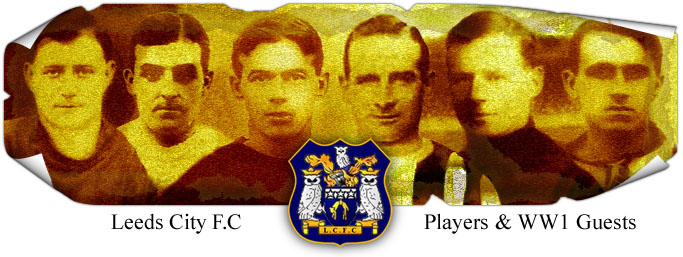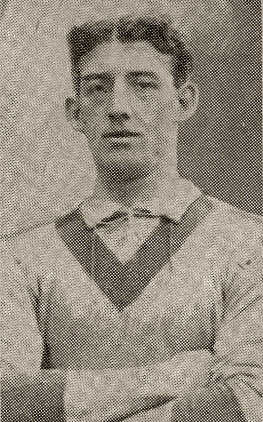

Dunn: John Henry (John)
1913-1919 (Leeds City Player Details)
(Leeds City War-time Guest Player Details)
Right Back
Born: Tyldesley, Lancashire: November 1888
Debut: v Sheffield United (h): 27-12-1915
Height & Weight: 5ft 10 1/2 ins: 12 st 7lb
Dunn started with his local team Eccles Borough and was talked about in Lancashire through his play and captaincy of Eccles Borough in 1912-13,
when they won the premier championship of the Lancashire Combination. Altogether he served three years with them. He then joined Leeds City in the
summer of 1913 being signed by celebrated manager Herbert Chapman, when he and another full-back signing, Albert Urwin, were described by the
Leeds Mercury as "players with fine physique. They are a reliable pair of backs who kick with plenty of power." Dunn failed to make it into the City first
team and left the club in June 1914 to play for Luton Town. He left Leeds City in June 1914, along with Hugh Roberts, to join Non-League Luton Town,
who had just been promoted into the First Division of the Southern League. The Football Leagues announced that the 1914-15 season would run as
usual. Players were under legally binding contracts until the end of the season and in any case general opinion in England was that the war would be
over by Christmas. Some felt that all forms of entertainment should be curtailed in time of war and the campaign to close down football began almost
immediately. A number of draconian measures began to be suggested in the national press: all professional contracts should be cancelled, football
pools should be stopped, no one under the age of 40 should be allowed to attend matches. Professional clubs began to publicise their response to
the war which included regular collections for War Relief funds, recruitment speeches at football matches and making their grounds available for
military drill. They were unable to appease their opponents particularly when it became clear that only a small number of footballers had voluntarily
enlisted and that they mainly came from Northern clubs. On 16th November 1914, four months after Britain's entry into the First World War, Dunn
enlisted in the 17th (Service) Battalion of the Duke of Cambridge's Own (Middlesex Regiment) with his Luton team mates Wileman, Simms, Frith,
Roe and Wilson. In doing so he was following the example set by his team mates Roberts and Lindley who had signed up the day before. Lindley
and Dunn shared lodgings at a house called Ruthaven in Shaftesbury Road, Luton. Dunn continued to be available to play for Luton in the 1914-15
season whilst undergoing military training. In November 1915 he was transferred to the 27th (Depot) Battalion of the Middlesex Regiment and released
in March 1916 to work in a munitions factory in Liverpool, where he played for Everton in war-time friendly games. It was while he was there that he
made four appearances for Everton in the Principal Tournament for 1916-17. He never made a Football League appearance for City and was restricted
to just the one game with them during war-time. He did however give good service to the City teams other than the first team. He returned to Elland
Road for a spell during the First World War and played right-back at Elland Road against Sheffield United on 27th December 1915 in place of Charlie
Copeland, as City lost 3-2. That was Dunn's only appearance for Leeds. He returned to play for Luton in 1919-20 before returning to League football
when he joined Second Division The Wednesday in 1920. He made eight appearances for them before disappearing from
professional football at the end of the 1920-21 season.
| Appearances | Goals |
| Nil | Nil |
| |
| War-time Guest Appearances: | |
| Principal Tournament 1 | 0 |
| Subsidiary Tournament 0 | 0 |
| Total 1 | 0 |